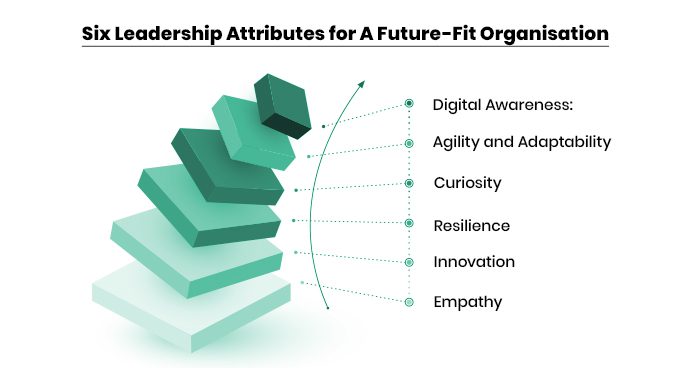For some years, thought leaders have been indicating a time of increasing volatility, uncertainty, complexity and ambiguity — the VUCA world. Long caught in rigidity, it is in recent times, with the digital disruption forced by Covid-19, leaders have significantly felt the pressure to act in the affirmative and develop for sustainability.
Technology and globalisation are constantly defining the future of work; organisations will need to be deliberate in building the right leadership skills required to succeed in these agile times. Today, many organisations seek to prepare themselves for the future by ensuring leadership skills cut across every level for optimal performance and to lead in agile times for a future proof business.
This article discusses six key leadership attributes needed for a future-ready organisation.
1. Digital Awareness: With technology leading disruptive market changes and the need for strategic repositioning, leaders must consistently be aware of digital innovations within and without their market space. While leaders do not need to be technically vast in these technologies, they must lead and sponsor cultural shifts and enable an environment that can easily leverage digital innovation opportunities and reward behaviours consistent with the desired digital culture. Digital culture has a direct potential proportionality to the innovation index of the organisation.
2. Agility and Adaptability –This involves changing ourselves to fit into new circumstances or a new environment. Rapid changes in market expectations, regulations, digital and technology landscape, and competition put a high demand on our ability to respond and adapt quickly. Agile leaders can move faster through unknowns as they can focus on the actions and decisions to yield desired outcomes.
Here are some tips for adaptability.
- Step outside your comfort zone
- Embrace unknowns and the challenge of unfamiliar terrains
- Do not be afraid to take risks
- Be open to learning
3. Curiosity – It is impossible to gain significant knowledge and promptly respond to changes without asking the right questions. Curiosity is one skill that separates excellent leaders from those perceived as less effective and helps to provide context, understanding and build trust. As described by Bill Gates, curiosity is one of the three Cs of successful leadership, along with Creativity and Commitment.
4. Resilience – We are in the face of pressing business changes and market disruptions; leaders must be resilient both personally and professionally. Building resilience is vital to successfully navigate times of uncertainty and challenges and lead teams to success with courage and conviction. This attribute connects with one’s ability to adapt even as it relies on one’s knowledge about self, values, confidence, and optimism.
A resilient leader must possess the following characteristics:
- Maintain a positive outlook
- Be comfortable in asking for help
- Leverage every opportunity to learn
- Build Strong Emotional Intelligence
5. Innovation – To accelerate change in today’s global business environment, leaders need to be innovative. Innovation transcends developing and introducing new things but is fundamentally based on adding value. Value, however, is derived from both small incremental changes and significant pivotable improvements. Innovation is not tied to titles – Innovative leaders lead themselves and lead others as team leaders and businesses. Innovation also requires disconnecting extant and emotional investments in old approaches while aiming for better business results. Innovative leaders lead with innovation by frequently inspiring productivity, spurring new ways and unique methods to yield better results.
Here are some characteristics of an innovative leader.
- Willingness to embrace new opportunities
- Efficiency
- Continuous learning
- Effective communication
6. Empathy – Empathetic leadership means having the ability to understand the needs of others and being aware of their feelings and thoughts. It is the ability to live and experience the story as if it were our own. The capacity to empathise can be developed by listening, being vulnerable to ourselves, accounting for our needs, and expanding our frame of reference. Leaders who are intentional about understanding the pressing needs of their employees can provide them with the adequate support needed to press ahead and deal with the challenges or issues that might be holding them back from executing assigned tasks and achieving their goals.
Whether you’re new to a leadership role or an experienced leader, there is always more to learn, and leadership development is an ongoing process. Imbibing and consciously practising these skills will enable you to become an effective leader and rise to the challenge of these disruptive times.
At pcl., we have a rich array of courses, tools, and on-demand digital expert learning resources available to help you grow your leadership career and build a future-fit organisation.
Get in touch with one of our consultants today via digitallearning@phillipsconsulting.net to explore our effective learning solutions to build these leadership attributes.
Written by:
Yewande Okemati
Learning Experience Consultant
![]()

